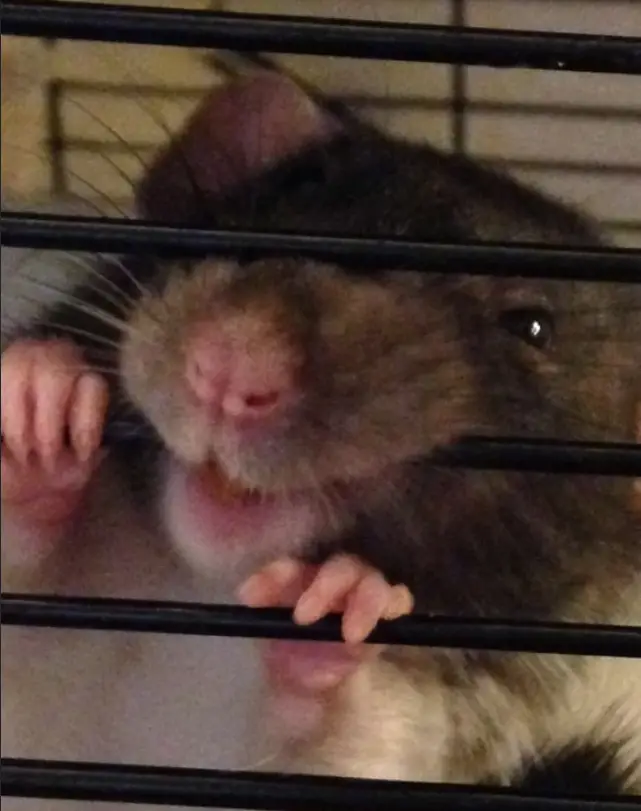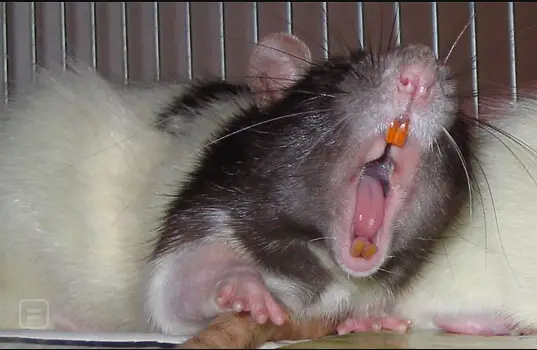Rats are some of the best pets you can have. They’re incredibly intelligent, sweet, affectionate, and very fun to care for.
However, sometimes they can also be quite mysterious. We’ve gone over some of the most common rat behavior before, but one particular behavior that many owners encounter that they do not know what to do with is cage chewing.
At first glance, seeing that your rat chews on the bar or plastic of its cage can be a worrying sight. But do not worry, I’ll tell you why they do it and how you can prevent them from doing it in the future. Let’s take a closer look!

The 5 reasons why your rat chews on its cage
There are several reasons why your rat might be chewing on its cage. Here are the most common reasons:
1. Boredom
Rats are remarkably intelligent and need a lot of mental stimulation to prevent boredom. If they get bored, they can become destructive and that can show itself in many different forms. One of the ways that rat try to alleviate boredom is by chewing on things, and what better to chew on than your own cage?
To prevent boredom, make sure that your rat is not kept in solitude. Rats need buddies to keep them company. They’re miserable if left alone!
Secondly, you should make sure that their enclosure has enough enrichment. Things such as hammocks, tunnels, ropes, hiding houses and foraging toys are all great ways to make their cage more fun and interactive!
A rat that has a fun and interactive cage is much less likely to become bored and destructive.
2. Grinding down teeth

The second reason why your rat might be chewing on its cage is because they’re trying to grind down their teeth.
Rats have teeth that never stop growing. As a result, they need to grind them down. In the wild, this is not an issue for them because the food they eat is more than enough to grind down their teeth.
In captivity however, they need a variety of wooden chew toys to grind their teeth on.
If your rat does not have chew toys in its vicinity it’ll be unable to grind down its teeth. When the rat is not able to grind down its teeth on a toy or on food it’ll try to find another way.
Rat cages are typically made of hard material and rats will often use them to grind down their teeth if they have no other option.
Luckily, this is easily resolved! Leave some chew toys in your rat’s enclosure and you’ll notice that the cage chewing will stop very quickly!
3. Stress
The two reasons mentioned above are the most common reasons why your rat might be chewing on its cage. However, if you’re sure that they’re not bored and have enough toys to grind their teeth down on then your rat might be stressed.
One of the stress behaviors of rats is that they chew on their enclosure. Other signals of stress include:
- Hissing
- Excessive grooming
- No grooming at all
- Aggression
- Shivering
- Diarrhea
- Loss of appetite
If you notice that your rat is showing stress-signals, it’s important to locate the source of their stress and remove it.
Things that stress rats out include certain smells (such as peppermint oil, or the smell of a cat), loud noises, improper diet, or too much light.
If you remove the source of their stress, the cage biting might stop.
4. Cage too small
According to the University of Alabama Huntsville:
All rats should have a minimum cage height of 7 inches (17.8 cm), according to the Guide. Rats housed in groups should have at least 17 to 70 square inches (109.6 to 451.5 cm) of floor space per rat, depending on weight. A female rat and her litter would need at least 124 square inches (800 cm) of floor space.
However, that’s the bare, bare minimum for lab rats. For pet rats, make sure that you give each rat at least 2.5 cubic feet of space.
If the cage is too small they can start to show escapist behavior, one of which is chewing on the cage bars.
The remedy here is easy; replace the small cage with a larger one!
5. Attention seeking
Rats love attention and affection but they sometimes go about seeking your attention the wrong way.
If your rat chews its cage and you reward this behavior with treats or attention then you’re unknowingly reinforcing this behavior.
However, this is a delicate line to cross. Of course, you don’t want to reinforce bad behavior in your rat, but you also don’t want to ignore it if something is actually wrong with them!
The best way to go about this is to first check if you can rule out all the other reasons mentioned above. If your rat has a spacious cage, does not appear stressed or bored, and has plenty of chew toys then ignoring their cage chewing might work in getting them to stop doing it.
Wrapping up
So, there you have it, the 5 most common reasons why rats chew on their cage and how to resolve them. Luckily, cage biting is a problem that’s usually simple to resolve because the reasons behind it are easily remedied.
Boredom, a lack of chew toys, and too small a cage are all problems that can be solved within a day. The only more persistent problem that can lead to this behavior is stress, but in the case of stress it’s all the more important that it’s resolved quickly because a stressed rat has a much lower lifespan and is not happy.
Attention seeking is also a problem that can be a bit more difficult to solve. However, if you give your rat plenty of attention and love while refraining from rewarding bad behavior then even this can easily be remedied!
Hopefully these tips helped you make your rat comfortable!
- How Long Do American Eskimo Dogs Live? Important Factors and Care Tips - September 29, 2023
- Do American Bulldogs Need Grooming? Essential Tips and Care Guidelines - September 29, 2023
- Do Bengal Cats Enjoy Playing? Essential Tips for Keeping Them Active - September 29, 2023